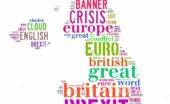Johannah Bernstein post: "eternally proud of my father’s extraordinary aeronautical engineering. legacy. here is a photo of the Canadair Water…
Wednesday Night #1976 with Peter Berezin
Written by Diana Thebaud Nicholson // January 29, 2020 // Wednesday Nights // Comments Off on Wednesday Night #1976 with Peter Berezin
Always happy to announce that Peter Berezin will be with us and this week there is certainly much to comment on.
In his most recent report, Peter has highlighted the following
• Global growth is poised to accelerate this year, although the spread of the coronavirus could dampen spending in the very short term.
• History suggests that the likelihood of a recession rises when unemployment falls to very low levels.
• Three channels have been proposed to explain why that is: 1) Low unemployment can prompt households and businesses to overextend themselves, making the economy more fragile; 2) Faster wage growth stemming from a tight labor market can compress profit margins, leading to less capital spending and hiring; 3) Shrinking spare capacity can fuel inflation, forcing central banks to raise rates.
• The first channel is highly relevant for some smaller, developed economies where housing bubbles have formed and household debt has reached very high levels. However, it is not an immediate concern in the US, Japan, and most of the euro area.
• We would downplay the importance of the second channel, as faster wage growth is also likely to raise aggregate demand and incentivize firms to increase capital spending on labor-saving technologies.
• The third channel poses the greatest long-term risk, but is unlikely to be market-relevant this year.
• Investors should remain bullish on global equities over the next 12-to-18 months. A more prudent stance will be warranted starting in the second half of 2021.
International Holocaust Remembrance Day
On January 27, 1945, Soviet troops enter Auschwitz, Poland, freeing the survivors of the network of concentration camps—and finally revealing to the world the depth of the horrors perpetrated there.
Lest we forget? 75 years after Auschwitz, too many do
On the eve of Monday’s 75th anniversary of the liberation of the Auschwitz death camp, a new study has found that a quarter of French millennials haven’t heard of the Holocaust, while an earlier study of American millennials found that 66 per cent did not know what Auschwitz was. We wish all would have to read this excellent history from the Smithsonian.
Moreover, Seventy-Five Years After Auschwitz, Anti-Semitism Is on the Rise
The previous day, 26 January, was Australia Day commemorating the day in 1788, Captain Arthur Phillip guided a fleet of 11 British ships carrying convicts to the colony of New South Wales, effectively founding Australia (though the country’s indigenous population would dispute the claim). Not much of a celebration for the population this year as Australian officials warned communities in bushfire-ravaged eastern states to strengthen fire defense amid forecasts of soaring temperatures and strong winds, as one approaching blaze cloaked the capital in thick smoke. Bushfires have killed 33 people and about 1 billion animals since September, while 2,500 homes and an area the size of Greece have been destroyed. Firefighters have used several days of cooler, damper weather across much of the continent to try to gain control of more than 100 blazes still burning before temperatures rise again from mid-week.
The Impeachment trial continues to dominate the U.S. media, especially since the New York Times’ weekend report that in an unpublished manuscript of John Bolton’s upcoming book, he claims Trump personally told him last year that he would withhold military aid from Ukraine until it launched a politically motivated investigation into former Vice President Joe Biden. The revelation shatters Trump’s biggest defense in the impeachment inquiry: that there are no firsthand witnesses who can directly confirm that he engaged in a quid pro quo regarding Ukraine.
It also boxes in Republican senators who have been against calling new witnesses in Trump’s trial.
I never thought I would applaud John Bolton, but as writes in The Method in John Bolton’s Madness “if he does end up further exposing Mr. Trump’s duplicity, in the fullness of time Mr. Bolton will end up, however fortuitously, on the right side of history.”
After three years, the long-promised Middle East Peace Plan was unveiled at the White House on Tuesday.
[The] highly anticipated peace plan was widely criticized even before its details were known. But rather than viewing it as a serious blueprint for peace, analysts called it a political document by a president in the middle of an impeachment trial working in tandem with Mr. Netanyahu, a prime minister under criminal indictment who is about to face his third election in a year. In multiple interviews right after the administration released its proposal on Tuesday, Jared Kushner, the architect of the Plan, said Israel’s rapid growth — in other words, the settlements — are precisely why Palestinian leaders should make a deal now.
On a positive note: On Wednesday, Trump to sign North American trade pact at White House, The United States-Mexico-Canada Agreement must still be ratified by Canada before it can take effect. The U.S. Senate this month overwhelmingly approved the legislation, sending the measure to Trump for him to sign into law.
The Mexican parliament has already approved the deal. Trudeau, Freeland urge opposition parties to pass bill on new NAFTA swiftly
Countdown to Brexit
Brexit: EU to start talks with UK over future relationship on 3 March
Negotiators face challenging 10-month deadline as leaked EU papers warn of ‘cliff edge’
A UK minister has attended a European Union meeting for the final time before the country leaves the bloc on Friday.
The European Parliament will hold its vote on the Brexit deal on Wednesday.
Meanwhile, the U.K. Will Allow Huawei To Build Part Of Its 5G Network, Despite U.S. Pressure
The Spectator writes that “Announcing the decision, the government was clear that this decision was not just a free pass for the Chinese company – it comes with caveats. There is a ban on Huawei being used in ‘core’ parts of the network and the company is only allowed to account for up to 35 per cent of the networks’ peripheral equipment. However, these conditions have not been enough to please critics … a number of Tory MPs have expressed concern at the decision while there has been an undeniably frosty reaction on the US side. The Republican Senator Tom Cotton likened the decision to allowing the KGB to build the UK’s telephone network during the Cold War.”
On Wednesday, facing threats of retaliation from both Washington and Beijing, the EU unveiled security guidelines for next generation high-speed wireless networks that stop short of banning Huawei, in the latest setback for the United States’ campaign against the Chinese tech company.
The EU’s executive Commission on Wednesday outlined a set of strategic and technical measures aimed at reducing cybersecurity risks from fifth-generation, or 5G, mobile networks. The recommendations include blocking high-risk equipment suppliers from “critical and sensitive” parts of the network, including the core, which keeps track of data and authenticates smartphones on the network.(EU stops short of recommending full ban on Huawei from 5G network)
And Canada is studying U.K.’s decision to grant Huawei partial access to 5G network
Wuhan coronavirus (nCoV-2019)
Although China has issued the largest quarantine in human history — locking down 16 cities, fears of a global pandemic have been raised by the number of people leaving Wuhan in the 24 days between the first cases of infection being reported on December 30 and the decision to suspend travel out of the city on Thursday. Thousands had flown to Hong Kong, Thailand, Singapore and Japan. Thailand has reported 14 cases of infection; Hong Kong has eight; the United States, Taiwan, Australia and Macau have five each; Singapore, South Korea and Malaysia each have reported four; Japan has seven; France has four; Canada has three; Vietnam has two; and Nepal, Cambodia and Germany each have one. There have been no deaths outside China.
Early days, but good news
Australian lab first to grow Wuhan coronavirus outside China
It’s a “significant breakthrough,” which will enable accurate investigation and diagnosis of the virus globally, per a statement by the Doherty Institute released Tuesday morning (ET), from where the virus was grown. It’s hoped it will help efforts to treat the virus. The virus will be shipped to scientists at expert laboratories that are working closely with the World Health Organization (WHO) in Europe and used in Australian public health labs as “positive control material.”
Meanwhile, China is Building a Hospital in 10 Days
Coronavirus: How to protect yourself emphasizes the importance of good handwashing, especially after using public transit or grocery shopping. “Lots of people touch things, and you don’t know who is sick and who might have contaminated a surface. We also don’t know how long this virus can survive on surfaces, and that can vary depending on what type of surface it is.” A major problem is the range from one day to 14 days before people will develop symptoms after they get infected.
One appalling concern is the possible impact on the imprisoned Uighur Muslims detained in prison camps across the region where conditions render the prisoners helpless to resist infection. More Health & healthcare/ September 2019 –
Facebook will now show you exactly how it stalks you — even when you’re not using Facebook
The new ‘Off-Facebook Activity’ tool reminds us we’re living in a reality TV program where the cameras are always on. Here are the privacy settings to change right now.
You can see how Facebook is stalking you, too. The “Off-Facebook Activity” tracker will show you 180 days’ worth of the data Facebook collects about you from the many organizations and advertisers in cahoots with it. This page, buried behind lots of settings menus (here’s a direct link), is the product of a promise CEO Mark Zuckerberg made during the height of the 2018 Cambridge Analytica scandal to provide ways we can “clear the history” in our accounts.
Economists’ corner
The story is dated March 2016, but presumably the principle is still valid.
The real life Gordon Gekko is supporting Bernie Sanders because of a basic economic principle
“Well, I think it’s quite simple again. If you look at something called velocity of money, you guys know what that is I presume, that means how much gets spent and turns around. When you have the top 1% getting money, they spend 5-10% of what they earn. When you have the lower end of the economy getting money, they spend 100-110% of what they earn.
Favorite story from Davos:
After Treasury Secretary Steven Mnuchin dismissed criticisms by climate activist Greta Thunberg, saying “After she goes and studies economics in college, she can come back and explain that to us”, The Washington Post contacted someone who did study economics in college and asked him to explain it to us. Gernot Wagner is a climate economist at New York University who has a joint A.B. in economics and environmental science and public policy from Harvard University, a master’s degree in economics from Stanford University, a master’s in political economy and government from Harvard, and a PhD in political economy and government from Harvard.
According to Wagner, Thunberg doesn’t need to go much further than Economics 101 to make her case.
We have not seen any reaction from Mr. Mnuchin to the story that BlackRock, the world’s largest asset manager, says that it will now make climate change central to its investment considerations. And not just for environmental reasons — but because it believes that climate change is reshaping the world’s financial system.
As Peter shares home and hearth with a Border Collie, it seems appropriate to draw your attention to “The Dog and the Frisbee” Although it dates from 2012 and refers to how central bankers and regulators should think about regulation after the 2008 financial crisis, its pertinence today is not limited to economics.
Varia
Sesame Street launches TV show for children affected by Syrian civil war
Sesame Workshop — the nonprofit, educational organization behind “Sesame Street” — has launched a new, locally produced Arabic TV program for the hundreds of thousands of children dealing with displacement in Syria, Iraq, Jordan and Lebanon. The program was initially funded by a $100 million award by the John D. and Catherine T. MacArthur Foundation. The LEGO Foundation then awarded an additional $100 million to deepen the play-based learning of “Ahlan Simsim” and gave Sesame Workshop the chance to expand to Bangladesh to serve families affected by the Rohingya crisis.
At the other end of the spectrum:
Aging Parents With Lots of Stuff, and Children Who Don’t Want It
It’s not only that they don’t want it; in many cases, they do not have room for it, or it is not practical.
Many thoughtful comments and suggestions follow the article. A partial solution is offered in Couple find novel way to downsize after 45 years in the same house which sounds like a delightful way of seeing some treasures off to a good home.
Housing is a human right: How Finland is eradicating homelessness
Economists and public policy people, please note:
Keeping people homeless, instead of providing homes for them, is always more expensive for the society. In Finland we have some scientific evaluations of the cost of this program. When a homeless person gets a permanent home, even with support, the cost savings for the society are at least 15,000 Euros per one person per one year. And the cost savings come from different use of different services.
In this study, they looked at the services that homeless people used when they were without a home. They calculated every possible thing: emergency healthcare, police, justice system, etc. They then compared that cost to when people get proper housing. And this was the result. I’m quite sure this kind of cost analysis can also be found for Canada.
Long reads
Mark your calendars
The Foreign Policy Events to Watch in 2020
From Brexit to the vote for UN security council seats to the G20 in Saudi Arabia, here are 11 events that will make waves this year.
The World Economic Forum deserves criticism, but we need it now more than ever
At the same moment that governmental leadership has faltered, the nature of our collective global challenges has shifted in ways that make corporate leadership and economic might all the more important.
The Wounded Presidency, Part One
The Untold Story of U.S. Foreign Policy During the Nixon Impeachment Crisis
(Foreign Affairs) Impeachment is the consummate domestic political story, but its repercussions are also global. When the commander in chief must fight for his political life, he can be tempted to make foreign policy a political instrument—and global adversaries can be tempted to exploit a wounded presidency. In Part One of this exhaustive two-part series, CNN presidential historian Timothy Naftali looks to the impeachment of President Richard Nixon for lessons about the crisis facing Washington today.
What Experts Do and Don’t Know About the Coronavirus Outbreak
Unfortunately, scientists still have more questions than answers about the new coronavirus. … a look at what they do and don’t know so far.
What to expect from a new Lebanese government: ‘Anti-corruption’ as witch hunt
President Michel Aoun and the political forces pulling the strings behind the new cabinet relish the opportunity to unleash, at last, the powers of the state against their pro-West political rivals. …the new government’s anti-corruption agenda will be selective. It will amount to vindictive retribution against those Lebanese political figures who had the temerity to stand up to, or represent, an alternative view to the anti-West Aoun-Hezbollah-Damascus vision for Lebanon that the incoming cabinet embodies



